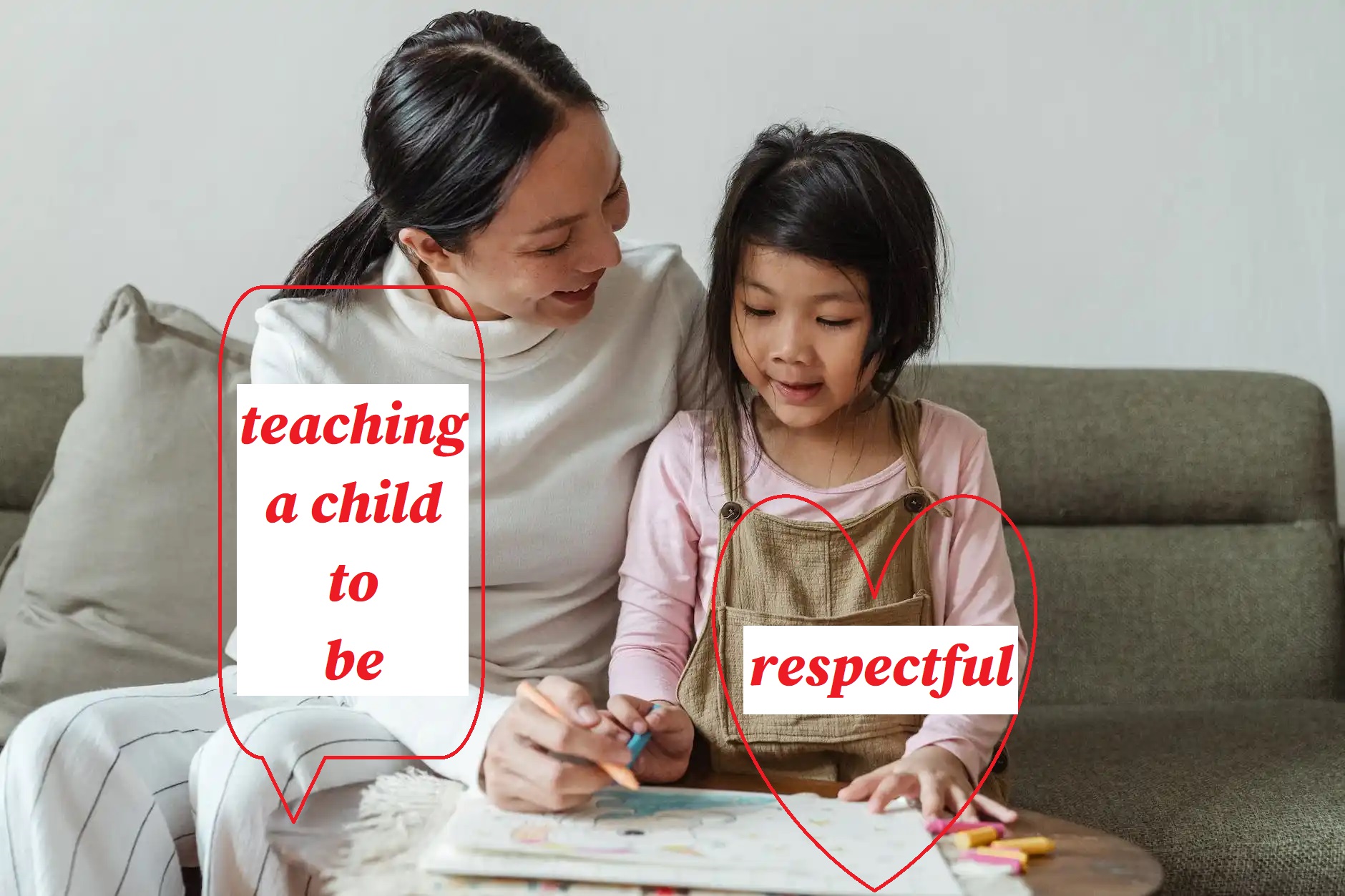Teaching children to be respectful to their parents, relatives, friends, elders, and behave well in school is an important aspect of their social and emotional development. Here are some tips to help you teach children about respect:
1. Lead by example: Children learn from what they see and hear. Model respectful behavior in your interactions with your child, as well as in your interactions with others. This includes being kind, considerate, and empathetic.
Yes, modeling respectful behavior is one of the most effective ways to teach children to be respectful. Children are constantly observing and imitating the behavior of the adults around them, especially their parents or primary caregivers. Therefore, it’s important for parents to model the kind of behavior they want to see in their children.
For example, if parents want their children to be respectful to their elders, they should model that behavior by being respectful to their own parents or grandparents. If parents want their children to be kind and considerate to others, they should model that behavior by being kind and considerate themselves. When parents model respectful behavior, children are more likely to internalize and adopt those behaviors as their own.
It’s important to note that modeling respectful behavior isn’t just about being kind and considerate to others. It’s also about how parents handle conflicts or disagreements. Parents can model respectful conflict resolution by using “I” statements, listening actively, and finding mutually beneficial solutions. When children see their parents modeling respectful conflict resolution, they learn important skills for resolving conflicts in their own lives.
In short, modeling respectful behavior is an essential component of teaching children to be respectful. By modeling respectful behavior, parents can help their children develop the skills and attitudes they need to interact with others in a positive and respectful way.
2. Teach them about respect: Explain to your child what respect means and why it’s important. Use age-appropriate language and provide examples of respectful behavior. Encourage them to ask questions and engage in discussions to deepen their understanding.
Yes, teaching children about respect is an important step in helping them develop respectful behavior. Here are some tips for teaching children about respect:
Explain what respect means: Use age-appropriate language to explain to your child what respect means. For younger children, you might say something like “respect means being kind and polite to others.” For older children, you might provide a more detailed definition, such as “respect means treating others with dignity, empathy, and consideration.”
Provide examples of respectful behavior: Give your child concrete examples of what respectful behavior looks like. For example, you might say “respectful behavior includes saying please and thank you, listening when someone else is speaking, and being patient with others.”
Encourage questions and discussion: Encourage your child to ask questions and engage in discussions about respect. This can help deepen their understanding of the concept and make it more meaningful to them.
Use real-life situations: Look for opportunities to teach respect in real-life situations. For example, if you see someone being treated unfairly, use that as an opportunity to talk to your child about the importance of treating others with respect and dignity.
Teach respect for diversity: Teach your child to respect and appreciate diversity in all its forms. This includes differences in race, culture, religion, and ability. Encourage your child to learn about and celebrate differences, and discourage stereotyping and prejudice.
By teaching children about respect, parents can help them understand why it’s important to treat others with kindness, empathy, and consideration. This can help children develop strong relationships with others and become caring, respectful individuals.
3. Set clear expectations: Be clear about what behaviors you expect from your child, both at home and in school. This can include things like using polite language, listening to others, and following rules.
Yes, setting clear expectations is an important step in teaching children to be respectful. Here are some tips for setting clear expectations:
Be specific: Be clear about what behaviors you expect from your child. Instead of saying “be respectful,” provide specific examples of what respectful behavior looks like, such as “saying please and thank you,” “listening when someone else is speaking,” and “using kind words.”
Use positive language: Instead of focusing on what your child shouldn’t do, focus on what they should do. For example, instead of saying “don’t interrupt others,” say “wait until someone else is finished speaking before you speak.”
Set consequences: Be clear about what the consequences will be if your child doesn’t meet your expectations. For example, if your child is disrespectful to an adult, the consequence might be that they lose a privilege, such as screen time.
Be consistent: Be consistent in enforcing the expectations you have set. If your child sees that there are no consequences for disrespectful behavior, they are less likely to take your expectations seriously.
Involve your child: Involve your child in setting expectations. Ask them what behaviors they think are important for showing respect and listen to their ideas. When children are involved in setting expectations, they are more likely to take ownership of them and follow through.
By setting clear expectations for respectful behavior, parents can provide their children with a clear understanding of what is expected of them. This can help children understand the importance of respectful behavior and make it more likely that they will follow through with the desired behaviors.
4. Reinforce positive behavior: When your child demonstrates respectful behavior, provide positive feedback and praise them. This reinforces their behavior and encourages them to continue.
5. Correct negative behavior: When your child displays disrespectful behavior, correct them in a firm but kind manner. Use the opportunity to teach them about the appropriate behavior and why it’s important.
Correcting negative behavior is an important aspect of parenting and can help your child learn appropriate behavior. Here are some tips for correcting negative behavior:
Stay calm: It’s important to stay calm when correcting negative behavior. Yelling or getting angry can escalate the situation and make it more difficult to communicate with your child.
Be clear: Explain to your child what they did wrong and why it was disrespectful. Use clear language and avoid using negative language or labeling your child as “bad” or “naughty.”
Provide alternatives: Offer your child alternative ways to handle the situation in a respectful way. For example, if they interrupted someone, suggest that they wait their turn to speak.
Be consistent: Consistency is key when correcting negative behavior. Make sure that you correct your child every time they display disrespectful behavior, and make sure that you follow through with any consequences that you have established.
Encourage communication: Encourage your child to communicate their thoughts and feelings in a respectful way. This can help them to develop better communication skills and avoid disrespectful behavior in the future.
By correcting negative behavior in a firm but kind manner, you can help your child learn about appropriate behavior and understand why it’s important. This can help them to develop better social skills and become more respectful and considerate individuals.
6. Encourage empathy: Help your child understand and empathize with others by encouraging them to see things from another person’s perspective. This can help them develop a greater understanding of different viewpoints and build stronger relationships.
Encouraging empathy in children is an important part of helping them develop social and emotional skills. Here are some tips for encouraging empathy in your child:
Model empathetic behavior: Children learn by watching the behavior of those around them. When you demonstrate empathetic behavior, your child is more likely to do the same.
Use teachable moments: Use everyday situations as opportunities to teach your child about empathy. For example, if your child is upset, ask them how they would feel if they were in someone else’s shoes.
Talk about feelings: Encourage your child to talk about their own feelings and emotions, as well as the feelings of others. This can help them to develop a greater understanding of different emotions and how they can impact behavior.
Read books or watch movies: Books and movies can be a great way to teach empathy to children. Look for stories that focus on the feelings and perspectives of different characters.
Practice active listening: Encourage your child to practice active listening when talking with others. This means paying attention to what the other person is saying and asking questions to show that they are interested in their perspective.
By encouraging empathy in your child, you can help them develop a greater understanding of others and build stronger relationships. This can also help them to become more compassionate and considerate individuals as they grow up.
7. Use consequences: If your child consistently displays disrespectful behavior, use consequences that are appropriate for their age and the situation. This can help them understand the seriousness of their behavior and motivate them to change.
Using consequences is an important part of teaching your child about the impact of their behavior on others and helping them learn to be respectful. Here are some tips for using consequences effectively:
Be consistent: Consistency is key when using consequences. Make sure that you follow through with the consequences you have established every time your child displays disrespectful behavior.
Be age-appropriate: Choose consequences that are appropriate for your child’s age and the situation. For example, if your child is younger, a time-out or loss of privileges may be effective, while an older child may benefit from a discussion about the impact of their behavior on others.
Be clear: Explain the consequences to your child in a clear and straightforward manner. Let them know what behavior is expected of them and what will happen if they continue to be disrespectful.
Be supportive: While it’s important to be firm when using consequences, it’s also important to be supportive. Let your child know that you love them and want to help them learn to be respectful.
Follow up: After using consequences, follow up with your child to discuss what they have learned and how they can improve their behavior in the future.
By using consequences, you can help your child understand the seriousness of their behavior and motivate them to change. This can help them to become more respectful and considerate individuals as they grow up.
Remember that teaching respect is an ongoing process that requires patience, consistency, and a willingness to model the behavior you expect from your child.
8. Teach social skills: Social skills such as listening, taking turns, and showing empathy are important for developing respectful behavior. Encourage your child to practice these skills by engaging in activities such as role-playing, storytelling, or playing games that require turn-taking.
Teaching social skills is an important part of helping your child develop respectful behavior. Here are some tips for teaching social skills to your child:
Use everyday situations: Look for opportunities to teach your child social skills in everyday situations. For example, when playing a game, you can teach them about taking turns, sharing, and being a good sport.
Role-play: Role-playing is a great way to help your child practice social skills. You can act out different scenarios with your child, such as how to introduce themselves to a new friend or how to resolve a conflict.
Storytelling: Reading stories together can also be a great way to teach social skills. Look for books that focus on themes such as empathy, friendship, and cooperation.
Play games: Playing games that require turn-taking and cooperation can help your child practice social skills. Board games, card games, and team sports are all great options.
Encourage communication: Encourage your child to communicate their thoughts and feelings in a respectful way. This can help them to develop better communication skills and avoid disrespectful behavior in the future.
By teaching your child social skills, you can help them develop the tools they need to navigate social situations in a respectful way. This can help them to build stronger relationships with others and become more respectful and considerate individuals.
9. Create a positive home environment: A positive home environment that is supportive, loving, and respectful can help children learn respectful behavior. Encourage positive communication, active listening, and conflict resolution skills in your family.
Creating a positive home environment is an important part of fostering respectful behavior in your child. Here are some tips for creating a positive home environment:
Encourage positive communication: Encourage open and positive communication in your family. This means actively listening to each other, expressing appreciation for one another, and avoiding negative or hurtful language.
Model respectful behavior: Children learn by example, so it’s important to model respectful behavior in your own interactions with your family members.
Set clear boundaries: Set clear boundaries for behavior in your home and enforce them consistently. This can help create a sense of security and stability for your child.
Encourage conflict resolution: Teach your child conflict resolution skills such as active listening, compromise, and problem-solving. Encourage them to work through conflicts in a respectful and positive way.
Show love and support: Show your child love and support through positive reinforcement, affection, and encouragement. This can help them feel valued and respected in your family.
By creating a positive home environment, you can help your child learn respectful behavior and develop the social and emotional skills they need to navigate the world. This can help them to become more confident, empathetic, and respectful individuals.
10. Encourage independence: Encouraging your child’s independence and decision-making can help them feel valued and respected. Involve your child in age-appropriate decision-making, such as choosing their clothes, planning activities, or preparing meals.
Encouraging independence in your child is an important part of fostering respectful behavior. Here are some tips for encouraging independence:
Give age-appropriate responsibilities: Give your child age-appropriate responsibilities such as helping with chores or making their bed. This can help them feel valued and contribute to the household.
Involve them in decision-making: Involve your child in decision-making, such as planning family activities or choosing what to eat for dinner. This can help them feel respected and valued.
Let them make mistakes: Allow your child to make mistakes and learn from them. This can help them develop confidence and independence.
Offer guidance and support: Offer guidance and support when your child is making decisions. This can help them learn to make informed choices and feel confident in their decision-making abilities.
Encourage problem-solving: Encourage your child to problem-solve on their own, such as coming up with solutions to conflicts with siblings or friends.
By encouraging independence in your child, you can help them develop the skills they need to make respectful decisions and navigate the world with confidence. This can help them become more self-assured and respectful individuals.
11. Practice cultural awareness: Teaching children to respect and appreciate different cultures, religions, and beliefs can help them develop greater empathy and respect for others. Expose your child to different cultures through books, movies, food, and music.
Cultural awareness is an essential aspect of teaching children to be respectful about diversity and acceptance. By exposing children to different cultures, they can develop an understanding of different lifestyles, traditions, and beliefs.
Here are some ways to practice cultural awareness with children:
Read books from diverse authors that showcase different cultures, beliefs, and lifestyles. It will help children learn about the world around them and develop empathy and respect for others.
Encourage your children to try new foods and learn about different cuisines. It can help them appreciate different cultures and develop a love for different types of food.
Watch movies that showcase different cultures, languages, and traditions. It will help children develop a better understanding of the world around them and learn about different lifestyles.
Listen to different types of music from different cultures. Music is a universal language that can help children appreciate different cultures and traditions.
Take children to cultural events, festivals, and exhibits. It will help them immerse themselves in different cultures and learn about different traditions.
In summary, practicing cultural awareness is an important aspect of teaching children about diversity and acceptance. It helps children develop empathy and respect for others and encourages them to appreciate different cultures, religions, and beliefs.
12. Engage with their school: Encourage your child to respect their teachers, classmates, and school rules. Communicate regularly with their teachers and participate in school activities to reinforce positive behavior.
Engaging with your child’s school is an essential aspect of supporting your child’s education and reinforcing positive behavior. When parents actively engage with their child’s school, it creates a positive and supportive environment for the child, which can lead to better academic and social outcomes.
Here are some ways to engage with your child’s school:
Attend parent-teacher conferences regularly. This is an excellent opportunity to discuss your child’s progress, strengths, and areas that need improvement.
Communicate regularly with your child’s teacher. Keep in touch with the teacher to know how your child is doing in school and to address any issues that arise.
Participate in school events and activities. Attend school events such as parent-teacher association meetings, school concerts, or sports events to support your child’s involvement and show your interest in their education.
Encourage your child to respect school rules and their classmates. Reinforce positive behavior at home and discuss the importance of respect for others.
Support your child’s homework and school projects. Help your child with their homework and provide guidance for school projects to help them succeed academically.
In conclusion, engaging with your child’s school is crucial to support their education and reinforce positive behavior. Regular communication with teachers, participation in school activities, and encouraging respect for school rules and classmates are all great ways to engage with your child’s school.
Remember, teaching children to be respectful is an ongoing process that requires patience, consistency, and positive reinforcement. With time, patience, and practice, children can learn to be respectful to their parents, relatives, friends, elders, and behave well in school.
Teaching children to be respectful is a crucial part of a child’s upbringing and should be an ongoing process. Children should be taught to respect not just their parents and family members but also their teachers, classmates, and elders. Patience, consistency, and positive reinforcement are essential in helping children learn respect and good behavior. Modeling respectful behavior, active communication with teachers, participation in school activities, and encouraging respect for school rules and classmates are all great ways to help children learn respect and good behavior.
It’s important to remember that children learn by example. As parents and caregivers, it’s essential to model respectful behavior, communication, and interactions with others. Encouraging open communication, active listening, and showing empathy towards others can help children develop respect for others and become well-behaved individuals.





hi!,I love your writing so much! share we keep up a correspondence more about your article on AOL?I need an expert on this house to unravel my problem.May be that’s you! Taking a look forward to peer you.